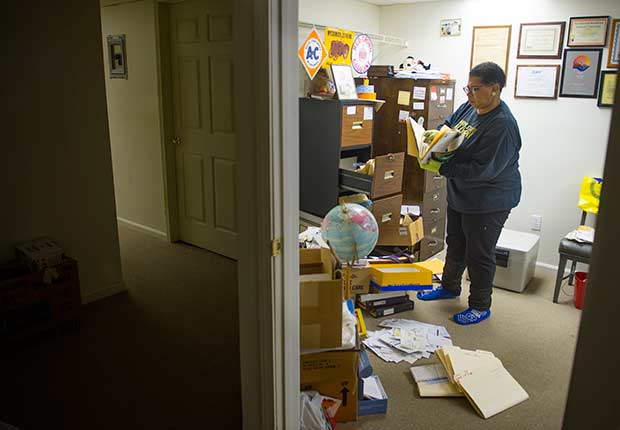AARP Hearing Center

By Melissa Preddy
As a loving daughter, Mary Clark had always planned to be at the bedside of her mother, Billie, through the trials of sickness and aging.
What she hadn’t anticipated was becoming a human resource manager, dispute mediator, traffic cop, practical nurse, benefits administrator and financier, all rolled into one. But that’s how much her role as chief caregiving coordinator expanded for more than three years, throughout her mom’s final days with dementia and other ailments.
Assembling a caregiving team made up of her two sisters, other relatives, paid assistants and her mother’s health care providers was more complex than she’d imagined.
From researching Medicare and Veterans Affairs programs to wrangling caregiving teams compose of paid aides and volunteer relatives to hearing family concerns about medication and treatment plans, her duties extended far beyond her mother’s bedside, Clark said.
“You don’t get any life lessons in how to prepare,” said Clark, 58, an assistant dean at Wayne State University in Detroit. “You give it your best shot and hope it is adequate.”
More than 65 million Americans are caregivers, with most tending to an older or ill adult relative, said Grace Whiting, communications director for the nonprofit National Alliance for Caregiving, based in Bethesda, Md. In Michigan, more than 2.1 million people provide caregiving services valued at roughly $15.5 billion a year.
“Yet caregiving is just not something that is talked about, relative to its great impact on most households,” Whiting said.
Focus on caregiver needs
To remedy that gap, AARP Michigan is testing a five-part free educational series this spring aimed at preparing and supporting family caregivers.
“People need help learning what’s out there in the community that they can plug into,” said Lisa Whitmore Davis, AARP Michigan associate state director for multicultural outreach and community engagement. “And caregivers will get help finding ways to respect their own needs, too.”
The two-hour sessions will cover topics including:
- Lost in translation: Experts will offer pointers to avoid misunderstandings between health care providers and caregivers, so that the flow of information affecting the patient is as accurate as possible.
- Stress reduction for caregivers: Covering two of the five sessions, these classes will address mental and physical health, including exercise tips and ideas for making comfort foods healthier for both patient and caregiver.
- Financial security: Participants will learn about safeguards against common forms of fraud and identity theft, as well as guidelines for ensuring financial security.
- Livable communities: Experts will discuss how to locate resources to help caregivers assist people who want to age in their homes.
Clark, who sometimes would sit in her car just to get a few minutes alone, applauds the stress segment in particular. “As the health of the loved one declines, the emotions of the caregivers escalate,” she said. “And juggling everything takes a lot of energy.”
The programs will be inclusive, Whitmore Davis said, with initial plans for classes to be offered in English and Spanish in communities including Detroit and Grand Rapids.
Talks are in progress to offer programming geared toward Michigan’s Arab American and LGBT communities.
“We’ll be discussing the best way to respect everyone’s lifestyle while they get the care they need,” she said. “And we think that caregiver support groups will grow from these seminars.”
Paul Bridgewater, president and CEO of the Detroit Area Agency on Aging, applauded the plan.
“The heart of the challenge is encouraging people to have these conversations and prepare,” said Bridgewater, who serves as a long-distance caregiver for his mother, who lives about 100 miles away.
“At the end of the day, this should be a family journey,” he said.
Information about AARP Michigan’s caregiving seminars is available at aarp.org/mi or by calling 866-227-7448 toll-free.
Additional help for caregivers is available online at the AARP Caregiving Resource Center, aarp.org/caregiving.
Melissa Preddy is a writer living in Plymouth, Mich.































































